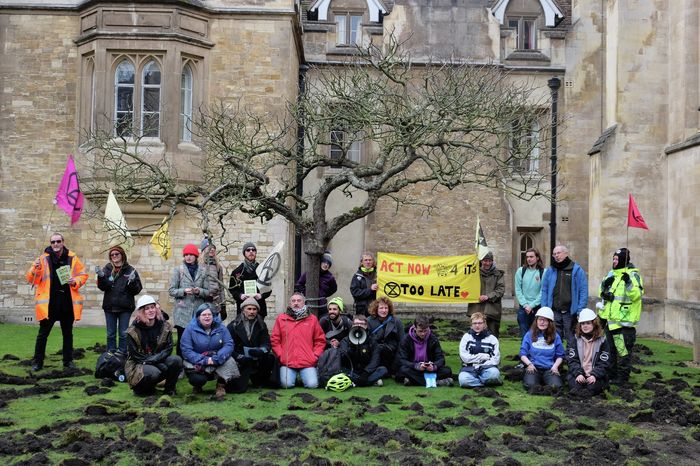Over 100 Trinity College Alumni Sign Letter Demanding Full Divestment
The letter highlights that Trinity is known to invest millions in companies involved in fossil fuel exploration, production, and refinement

Trinity alumni have delivered a letter to the College demanding full divestment from all direct and indirect investments in fossil fuels. The letter was signed by 110 Trinity alumni, ranging from former students who matriculated in the 1950s and 1960s through to last year’s graduates.
The letter, which was delivered at midday today (11/01), reads: “Investments are a political statement. While the College remains invested in fossil fuels it aligns its financial interest with—and endorses the behaviour of—the most destructive industry on the planet.”
It cites the fact that Trinity has invested at least £9.1 million directly into companies involved in oil and gas exploration, production, and refinement, as revealed in a landmark 2018 investigation by Varsity and the Oxford student newspaper Cherwell.
Signatories to the letter were asked how divestment would impact their willingness to donate to Trinity in the future. 81% of respondents indicated they would be more likely to donate more to the College if it divests fully.
Roland Clift CBE, an Emeritus Professor of Environmental Technology at the University of Surrey who matriculated at Trinity in 1960, said: “I have grandchildren and I care for their futures. Only a fraction of known fossil fuel reserves can be used without making the planet a desert, so the reserves are heavily overvalued—even financial self-interest says Trinity should get out before the crash.”
Amber Li, a signatory who matriculated in 2017, told Varsity: “I signed the petition because of the influence the alumni community has on Trinity, which is very clear through all the alumni outreach Trinity does. A petition circulated independently of the student body shows that Trinity’s financial, and therefore political, actions are being watched critically and keeps the pressure on.”
In February 2020, Extinction Rebellion activists dug up the lawn in front of Trinity and chained themselves to the symbolic Isaac Newton apple tree to protest against the College’s dealings with companies involved in the fossil fuel industry. Later in the year, the group claimed that Trinity’s investments might be as high as £16 million when investments in fossil fuel refinement and oil technology are taken into account.
Back in 2017, the Paradise Papers leak uncovered the off-shore investment practises of almost half of Oxbridge’s colleges. Cambridge and Oxford universities and their colleges were revealed to invest in a scheme managed by Guernsey-based private equity firm Coller International; one of the funds involved in the scheme invested £1 billion in a Joint Venture with Royal Dutch Shell, according to its website. In 2018, the Varsity and Cherwell investigation revealed that Trinity still had investments worth £1.1 million with Coller International, down from £9.9 million at the time of the Paradise Papers revelations.
In October 2020, the University committed to ending all direct and indirect investments in fossil fuels by 2030, in a move dubbed “a historic victory for the divestment movement.” However, many colleges continue to invest in their own right, including Trinity. Only two colleges - Christ’s, and Clare Hall - have so far made substantial commitments to ending both direct and indirect investments in fossil fuels, despite years of pressure on colleges from groups such as Cambridge Zero Carbon and Extinction Rebellion.
A further twelve colleges - Newnham, Robinson, St John’s, Fitzwilliam, Selwyn, Emmanuel, Downing, Peterhouse, Queens’, Lucy Cavendish, Jesus, and Trinity Hall - have committed publicly to partial divestment.
Varsity has contacted Trinity College for comment.
 News / CUP announces funding scheme for under-represented academics19 December 2025
News / CUP announces funding scheme for under-represented academics19 December 2025 News / SU reluctantly registers controversial women’s soc18 December 2025
News / SU reluctantly registers controversial women’s soc18 December 2025 News / Cambridge welcomes UK rejoining the Erasmus scheme20 December 2025
News / Cambridge welcomes UK rejoining the Erasmus scheme20 December 2025 Features / Should I stay or should I go? Cambridge students and alumni reflect on how their memories stay with them15 December 2025
Features / Should I stay or should I go? Cambridge students and alumni reflect on how their memories stay with them15 December 2025 Film & TV / Timothée Chalamet and the era-fication of film marketing21 December 2025
Film & TV / Timothée Chalamet and the era-fication of film marketing21 December 2025










